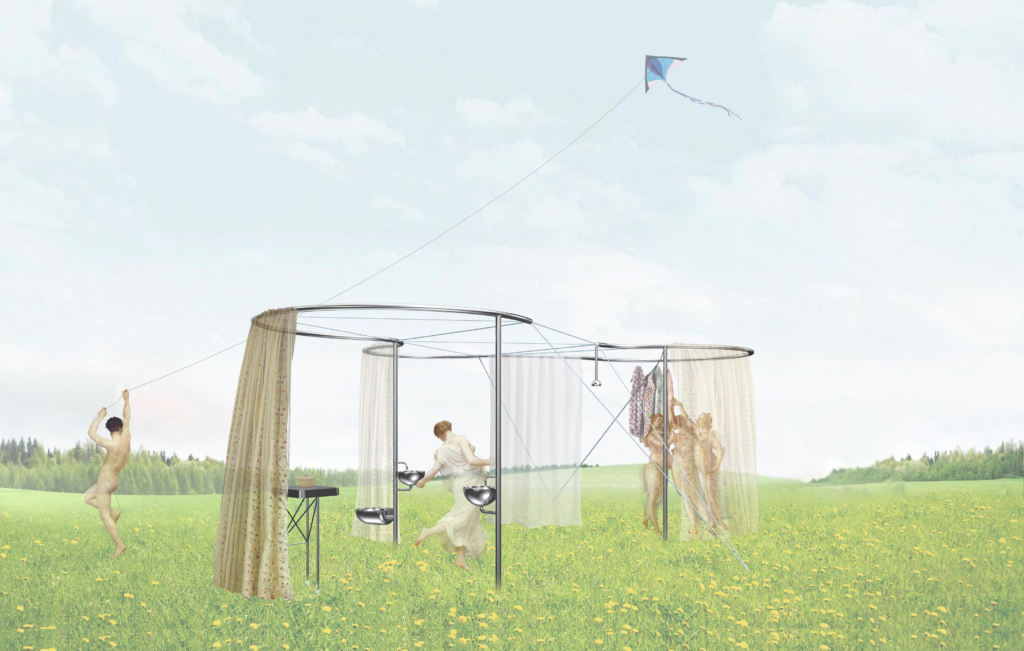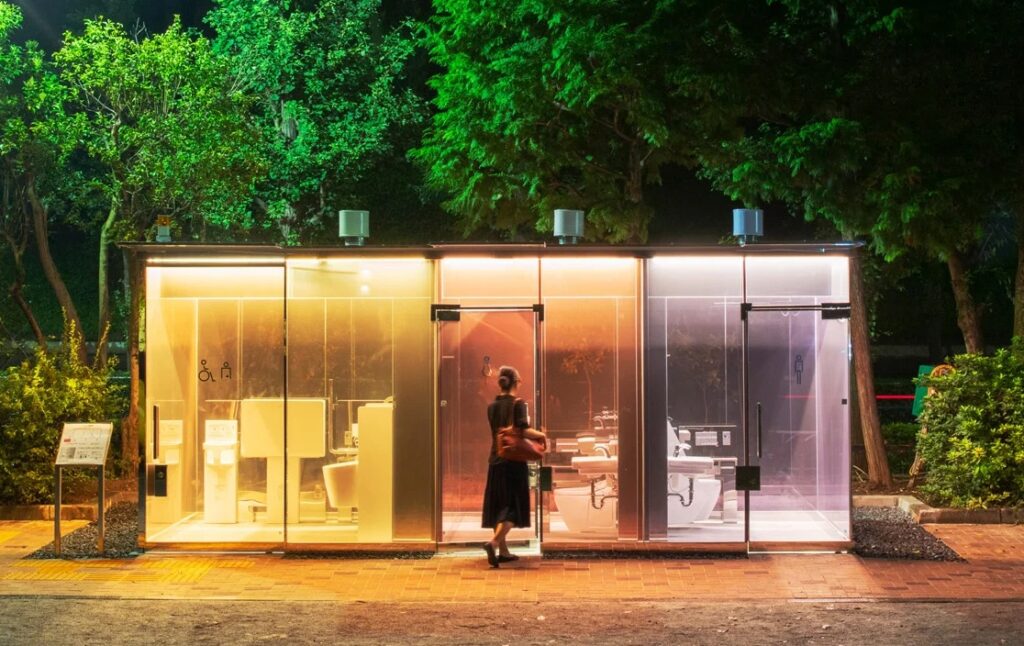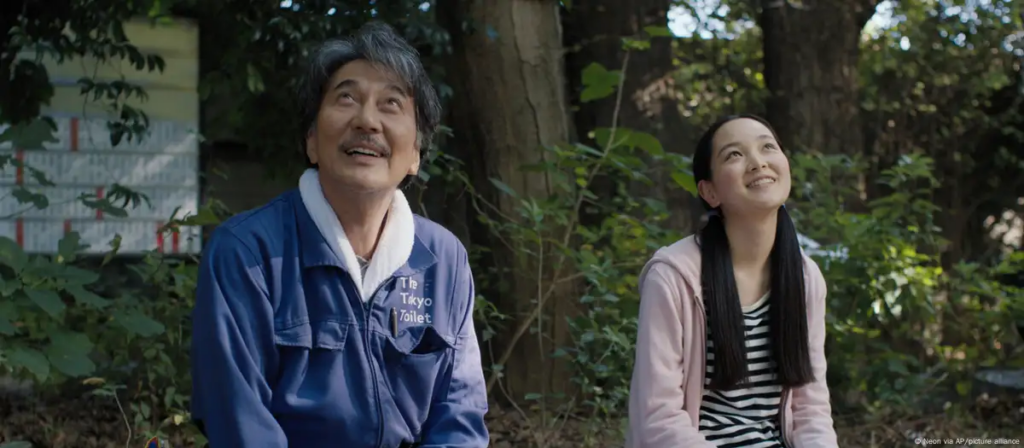
Tokyo is often recognized for its technological innovation and dazzling skyscrapers. Yet, behind the veneer of cutting-edge design and urban hyper-modernity, the city has a unique ability to harmonize its modern achievements with a deep respect for public well-being and care, presenting itself as a caring city. This blend is visible in many aspects of urban life, but perhaps nowhere more strikingly than in the public restroom spaces scattered throughout the city. These spaces are far from the utilitarian, often grimy public toilets found in many cities around the world. Instead, Tokyo’s restrooms—particularly those designed as part of the Tokyo Toilet Project (2018-2023)—serve as examples of how urban design can promote dignity, inclusivity, and comfort, even in the most basic spaces. This concept of care within the public realm finds a profound parallel in Wim Wenders’ 2023 film Perfect Days, where the life of a humble public restroom cleaner becomes the lens through which the film explores Tokyo’s public spaces, memory, and human connection.
I have admired Wim Wenders’ work since 1999 when he explored the human condition with such a sense of wonder and depth in Until the End of the World. His ability to capture intimate moments in grand, sweeping narratives resonated with me, and I found his 2011 film Pina to be a piece of art in itself—an evocative tribute to dance, architecture, and urban life, capturing its essence and the spirit of human expression in a way that transcends the medium of cinema. Wenders has a unique gift for making the smallest human gestures meaningful, and this sensibility is clearly present in Perfect Days.

Sou Fujimoto’s Public Toilet: A Precursor to the Tokyo Toilet Project
Long before the Tokyo Toilet Project, I was fascinated by Sou Fujimoto’s public toilet design in Ichihara, Japan. This was a pioneering concept in the integration of nature and architecture, where the restroom became an extension of its surrounding environment. Fujimoto’s toilet design, often referred to as a “garden escape,” is a seamless blend of architecture and landscape, where the built form embraces the natural world, providing a space of privacy and reflection within an urban setting. His design laid the groundwork for a broader conversation about how public restrooms can be more than utilitarian—transforming them into spaces of beauty, serenity, and integration with nature.

This early project is strongly related to our own Ludens Prototype, which reimagines the “home” as a surreal environment, inspired by Johan Huizinga’s Homo Ludens (1938), where living becomes an act of play. A pipe and a curtain allow for the joys of life—a private retreat for creatures to engage freely in the Eden of Pleasure, beyond the routine of labor. Physical and sensory continuity define the project, with arcs configuring a dynamic and fluid space, where the freedom of the individual reigns supreme.
The Tokyo Toilet Project: A Model for Care in Public Spaces
The Tokyo Toilet Project brings together 17 public restrooms in Tokyo’s Shibuya district, designed by architects including Toyo Ito, Shigeru Ban, and Sou Fujimoto. Commissioned by The Nippon Foundation as “a symbol of Japan’s world-renowned hospitality culture,” this project challenges and expands the idea of what public bathrooms can be. In a city where personal space is limited, these restrooms relate to the concept of urban domesticity or intimacy in the city. Tokyo’s approach to public restrooms goes beyond basic cleanliness and accessibility; it reflects a desire to provide spaces that make people feel respected and cared for.
One example is the Shibuya Triangle Toilet, designed by Nao Tamura. Inspired by Origata, the traditional Japanese art of gift-wrapping, Tamura’s design integrates bright red metal with a sleek, minimal aesthetic, creating an urban sculpture. Similarly, Kengo Kuma’s Nabeshima Shoto Park toilet blends seamlessly into its natural surroundings with cedar cladding, creating a serene, almost meditative environment for users. Located in a park, the restroom feels like an extension of the green space rather than an interruption. Kuma’s design prioritizes privacy and accessibility, providing a space that feels personal while remaining part of the public realm.

Shigeru Ban’s designs in Yoyogi Fukamachi Mini Park and Haru-no-Ogawa Community Park use transparent glass walls that become opaque when the restrooms are occupied. The transparency reflects the city’s focus on openness and inclusivity, while the transformation of the glass into an opaque shield when occupied ensures privacy. These public toilets are both functional and emotionally resonant—they provide a sense of security and respect in a busy, often anonymous city.
The Tokyo Toilet Project offers a stunning illustration of how cities can embed care into their designs, offering a balance between innovation and empathy. Tokyo’s public toilets are not just spaces for convenience—they offer a brief but meaningful respite in the midst of a bustling, high-speed metropolis.
A Path to the Toilet: Traditional Japan
In Japan, historically, toilets were often separated from the house. This separation is symbolized through the roji path, which is the pathway through the garden that leads to the toilet. Traditionally, this path was intended to cleanse and purify the user before they entered the toilet space, offering a moment of transition from different types of intimacy. Toilets were considered part of a more public intimacy, akin to bathing. In many ways, the Tokyo Toilet Project takes inspiration from this ethos by offering restrooms that are not just functional but are spaces that make users feel valued and respected.
The Caring City by Izaskun Chinchilla
Izaskun Chinchilla’s concept of the Caring City provides a critical framework for rethinking how urban environments address essential human needs. In her book The Caring City: Health, Economy, and Environment (2019), Chinchilla critiques how cities shaped by industrialization prioritize productivity and economic activities while neglecting non-commercial yet vital human activities such as resting, accessing free clean water, and engaging in leisure. She highlights how these omissions disproportionately affect vulnerable groups, including children, the elderly, and those with health conditions, who often rely on costly commercial spaces like cafes and restaurants to fulfill basic needs.

To address this imbalance, Chinchilla advocates for reimagining urban and architectural models with a focus on inclusivity and care. Her proposals include designing public furniture and amenities that cater to diverse needs: shaded areas for rest, water fountains providing free hydration, and spaces that encourage social interaction and play. This vision challenges conventional urban design by emphasizing care as a central value, fostering environments that prioritize the well-being and dignity of all citizens.
Perfect Days: Tokyo as a Reflection of the Caring City
Wim Wenders’ Perfect Days offers a cinematic reflection of Chinchilla’s ideas through its portrayal of Tokyo’s public spaces. The film follows Hirayama, a janitor (played by Kōji Yakusho), as he meticulously cleans and maintains public restrooms designed as part of the Tokyo Toilet Project. These restrooms are architectural landmarks that embody care and inclusivity, aligning with the principles of a Caring City.

Hirayama’s life is a meditation on the balance between the personal and the public. His humble home, filled with books, tapes, and small personal treasures, contrasts sharply with the futuristic public restrooms he maintains. This juxtaposition underscores one of the central themes of the film: the duality between the private and public realms in urban life. By focusing on Hirayama’s quiet dedication, Wenders illuminates the often-overlooked labor that sustains public spaces and connects the individual to the collective.
Perfect Days transforms the mundane into the meaningful, revealing how thoughtfully designed public spaces can enrich lives and foster dignity. Together with the Tokyo Toilet Project, the film exemplifies the potential of a Caring City—one that values the essential needs of its citizens and creates environments of respect, inclusion, and care.


Such an inspiring article! It is very conforting to know that in this day and age there are urban projects that focus specifically on the well-being, respect and care of people and their needs and also highlight the articulation of architecture with nature and the environment. A lot to learn about from.
Is fascinating to read about how public restrooms can be so important in the human experience in a city. Public restrooms in Japan are given a lot of attention, demonstrating the importance that Japanese society places on public well-being and care. Public restrooms around the world, are places we don’t want to go and see in public spaces, but the Tokyo Toilet Project, is promoting “dignity, inclusivity, and comfort, even in the most basic spaces”. Sou Fujimoto’s public restrooms are referred to as “garden escapes”, where he can create a space of privacy in the urban-public setting. To him, restrooms should be “spaces of beauty, serenity, and integration with nature.”